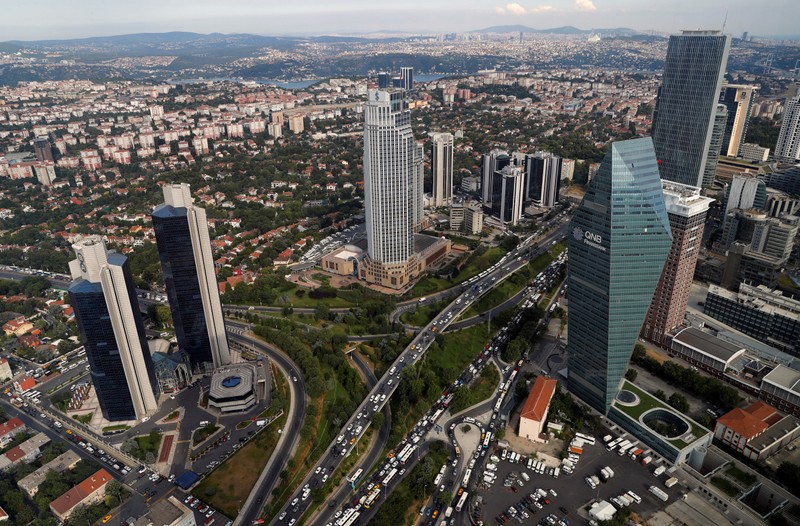
FILE PHOTO: Bussiness and financial district of Levent, which comprises banks’ headquarters and popular shopping malls, is pictured in Istanbul, Turkey, July 9, 2019. REUTERS/Murad Sezer
September 17, 2019
By Ali Kucukgocmen
ISTANBUL (Reuters) – The weekend attack on Saudi oil production facilities could delay Turkey’s efforts to contain inflation and to finally leave a recession behind if a supply shock means global oil prices stay elevated, analysts said.
Turkey, a major emerging market, imports almost all of its energy needs.
Saturday’s attacks on Aramco’s facilities in Abqaiq and Khurais raised the prospect of a major supply shock to an oil market that in recent months has focused on demand concerns due to pressure on global growth from the U.S.-China trade dispute.
Turkish inflation, which soared to a 15-year high of more than 25% in October last year in the wake of a currency crisis, edged down more than expected in August to 15.01%. Base effects are expected to help push it into single digits in September.
The central bank has based its policymaking mainly on inflation, setting its policy rate marginally above the inflation rate for a positive real yield. The bank cut its policy rate by 3.25 percentage points last week to 16.5%, saying that inflation is likely to fall below its year-end projection of 13.9%.
But the spike in oil prices could slow down the improvement in inflation in Turkey, which is almost completely reliant on imports to meet its energy needs.
Piotr Matys, emerging markets forex strategist at Rabobank, said Turkey’s economy could suffer if oil prices remain high in the long term.
“If oil remains at current levels in coming weeks then that’s going to have a negative implication for Turkey’s inflation, slow down the process of disinflation and in turn will require the central bank to slow down the pace of easing,” he said.
Is Investment said in a note that the government’s tax subsidies on gasoline prices, which are used to cushion the impact of price hikes on consumers, will temper the effects of higher oil prices on inflation.
“Its impact on current account will be limited if the rise in oil price stays around current levels. In addition, USD10 increase in oil price adds 0.3ppt to inflation,” it said.
“However … government tax subsidies on final gasoline prices will not change, thus impact of rise in oil on inflation will be much limited.”
Turkey imported 21 million tonnes of oil in 2018, of which 1.8 million tonnes came from Saudi Arabia, according to official data.
TENSIONS, GROWTH
Tipped into recession by last year’s currency crisis, Turkey’s economy has contracted year-on-year in each of the last three quarters.
The rise in oil prices could have implications for growth if it damages foreign demand by impacting global production chains, said Hilmi Yavas, economist at Yatirim Finansman.
“Exports have been carrying the weight, especially of the manufacturing industry, for the past year. If we see a blood loss here, it could lead to the growth outlook becoming worse than expected,” he said.
Yavas said the government would have to make a choice between abandoning some tax income by not passing price hikes fully onto consumers or risk higher inflation.
Turkey’s lira, which has declined some 8% against the dollar so far this year on top of a nearly 30% fall last year, has been hit by global uncertainties including the U.S.-China trade war and tensions in neighboring Syria.
U.S. President Donald Trump said on Monday it looked like Iran was behind the weekend attacks, charges Tehran rejects.
Further escalation of tensions in the Middle East could hit the lira, said Jason Tuvey, senior emerging markets economist at Capital Economics.
“Specifically given that Turkey has been fairly close with Iran in recent years, it is clearly a threat that if the United States launches military attacks on Iran, it may weigh on sentiment on Turkey,” he said.
(Additional reporting by Nevzat Devranoglu in Ankara and Can Sezer in Istanbul; Editing by Catherine Evans)

